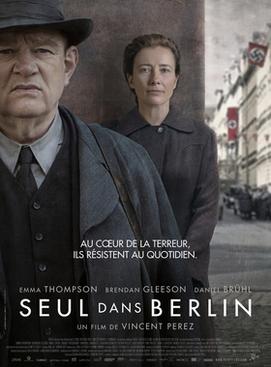Film Review: Alone in Berlin

Set in Nazi Germany from 1940-1943, 'Alone in Berlin' presents a series of simple acts of resistance by a dour middle-aged couple whose soldier son has died in the Battle of France. This is a strong story made even more powerful by the fact that it is inspired by real people and events, as portrayed in Hans Fallada’s 1947 novel, ‘Jeder stirbt sich allein’ (‘Everyone Dies Alone’).
It's June 1940, and Berliners are celebrating the German victory over France and the signing of an armistice in the same French railway carriage where Germany surrendered in November, 1918. We first meet Otto and Anna Quangel in their Berlin apartment as they are delivered a letter from the Wehrmacht informing them their only son has been killed on the battlefield. Otto is a Nazi Party member and Anna is involved in the NS-Frauenschaft - the National Socialist Women's League, but both begin to question their alliance to the Nazi regime.
Overcome by quiet grief, Otto begins to write postcards urging others to resist the Nazis and decrying their manipulation of the truth. With Anna’s help, Otto leaves these subversive cards at random locations across the city - under doors, in stairwells. The messages are headed ‘Free Press’. There is, of course, no free press in Nazi Germany. When Hitler came to power in 1933, he forcibly eliminated all his opponents, settling old scores with left-wing newspapers like the 'Munich Post', whose premises were wrecked by the ‘Brownshirts’ and its courageous journalists imprisoned and subsequently murdered. Having just written about the demise of the free press in Nazi Germany in my new novel-in-progress, I found the events of the film particularly affecting.
There are finely nuanced performances from the leads, Brendan Gleeson as Otto and Emma Thompson as Anna, together with Daniel Brühl, who gives an outstanding performance as the police inspector trying to track down the anonymous author of the postcards and being pressured by the Gestapo to solve the case. The acting is so understated that when the violent moments come, they are even more shocking.
The streets of Berlin in the early 1940s are depicted in muted monochromes by director Vincent Perez and his cinematographer, Christophe Beaucame. One exterior scene shows us the Gestapo headquarters covered in snow, the only touches of colour being the red background of the swastika banners hanging from the building.
From the film’s credits I discovered that the actual filming took place in Berlin itself and also in Cologne and a town called Görlitz in Saxony, which, Wikipedia tells me, served as a backdrop in 'The Grand Budapest Hotel', 'The Reader' and 'The Book Thief'.
What I particularly like about this film is that they’ve taken the time to get the details right – the dialogue, the historical facts, the costumes, even the posters promoting the Hitler Youth.
At a time when the concept of truth as an absolute value is being threatened by ‘alternative facts’, this film should resonate with all of us. The Quangels' brave acts of 'civil disobedience' may not have had the effect they anticipated in that most of their postcards were promptly handed over to the Gestapo; even so, their little campaign of resistance demonstrates that ordinary people can find ways to express their opposition, even in a tightly controlled society.
In many ways, ‘Alone in Berlin’ is a dour film, much like the couple at its centre, but it's also one of the most moving and powerful films I’ve seen in a long time.
Deborah O’Brien
4 March 2017
